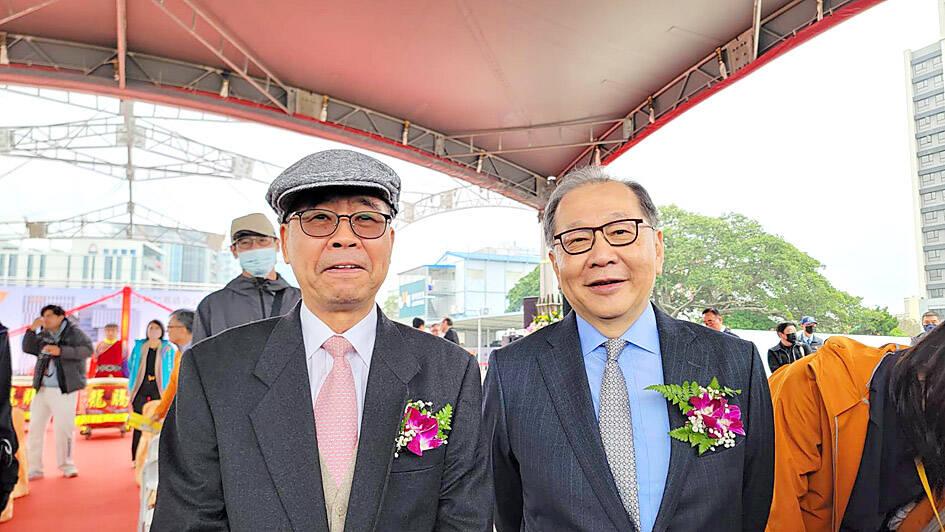Smartphone chip designer MediaTek Inc (聯發科) is planning to introduce its next-generation Dimensity 9400 chipset in the fourth quarter of this year to support artificial-intelligence (AI) applications, company CEO Rick Tsai (蔡力行) said yesterday.
Speaking at a ceremony where MediaTek broke ground on an office building close to the Hsinchu High Speed Rail station, Tsai said the Dimensity 9300 chipset, which was unveiled in early November 2022, was a success, with many clients expressing satisfaction with the product.
MediaTek has faith that the upcoming Dimensity 9400 would outperform the Dimensity 9300 and lead to another sales pinnacle for the company, he said.

Photo: Vanessa Cho, Taipei Tim
The launch of the Dimensity 9400 would be part of a development trend for smartphones to be equipped with AI applications, he added.
Commenting on the construction of the new office building in Hsinchu, MediaTek chairman Tsai Ming-kai (蔡明介) said the investment shows the company’s commitment to Taiwan’s IC design industry as well as its confidence in the nation’s technology development.
The construction of the office building, which has 12 floors above ground and five floors underground, is scheduled to be completed in 2027 and will accommodate 3,000 personnel as part of the company’s efforts to boost its talent pool, he said.
Taiwan’s semiconductor industry needs more investments in research and development and further cultivation of talent, he added.
Vice Premier Cheng Wen-tsan (鄭文燦), who attended the groundbreaking ceremony, said the government would continue to fully support to the local IC design industry.
The government has launched the five-year Taiwan Chip-based Industrial Innovation Program (晶片驅動台灣產業創新方案), which aims to boost the output of Taiwan’s IC design industry from 20 percent to 40 percent of the global total within 10 years.
MediaTek’s new office building is a good indicator of the investment sentiment in Taiwan, and its location would be convenient for northbound and southbound transportation, Cheng said
Cheng added that he believed the new building would become an outstanding research and development hub, praising MediaTek, which is among the top 10 IC designers in the global market, as a leader in the local IC industry.
MediaTek ranked as the fifth-largest IC designer in the world in the third quarter of last year, with Taiwan-based Novatek Microelectronics Corp (聯詠), specializing in display driver IC design, and communications network IC designer Realtek Semiconductor Corp (瑞昱), another Taiwanese company, ranking seventh and eighth respectively, according to Taipei-based TrendForce Corp (集邦科技).

‘SWASTICAR’: Tesla CEO Elon Musk’s close association with Donald Trump has prompted opponents to brand him a ‘Nazi’ and resulted in a dramatic drop in sales Demonstrators descended on Tesla Inc dealerships across the US, and in Europe and Canada on Saturday to protest company chief Elon Musk, who has amassed extraordinary power as a top adviser to US President Donald Trump. Waving signs with messages such as “Musk is stealing our money” and “Reclaim our country,” the protests largely took place peacefully following fiery episodes of vandalism on Tesla vehicles, dealerships and other facilities in recent weeks that US officials have denounced as terrorism. Hundreds rallied on Saturday outside the Tesla dealership in Manhattan. Some blasted Musk, the world’s richest man, while others demanded the shuttering of his

ADVERSARIES: The new list includes 11 entities in China and one in Taiwan, which is a local branch of Chinese cloud computing firm Inspur Group The US added dozens of entities to a trade blacklist on Tuesday, the US Department of Commerce said, in part to disrupt Beijing’s artificial intelligence (AI) and advanced computing capabilities. The action affects 80 entities from countries including China, the United Arab Emirates and Iran, with the commerce department citing their “activities contrary to US national security and foreign policy.” Those added to the “entity list” are restricted from obtaining US items and technologies without government authorization. “We will not allow adversaries to exploit American technology to bolster their own militaries and threaten American lives,” US Secretary of Commerce Howard Lutnick said. The entities

Minister of Finance Chuang Tsui-yun (莊翠雲) yesterday told lawmakers that she “would not speculate,” but a “response plan” has been prepared in case Taiwan is targeted by US President Donald Trump’s reciprocal tariffs, which are to be announced on Wednesday next week. The Trump administration, including US Secretary of the Treasury Scott Bessent, has said that much of the proposed reciprocal tariffs would focus on the 15 countries that have the highest trade surpluses with the US. Bessent has referred to those countries as the “dirty 15,” but has not named them. Last year, Taiwan’s US$73.9 billion trade surplus with the US

Prices of gasoline and diesel products at domestic gas stations are to fall NT$0.2 and NT$0.1 per liter respectively this week, even though international crude oil prices rose last week, CPC Corp, Taiwan (台灣中油) and Formosa Petrochemical Corp (台塑石化) said yesterday. International crude oil prices continued rising last week, as the US Energy Information Administration reported a larger-than-expected drop in US commercial crude oil inventories, CPC said in a statement. Based on the company’s floating oil price formula, the cost of crude oil rose 2.38 percent last week from a week earlier, it said. News that US President Donald Trump plans a “secondary